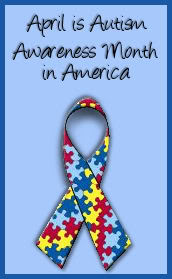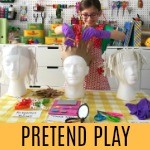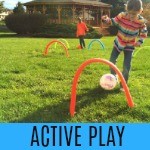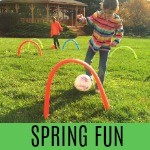 April is Autism Awareness Month, and while my own children do not fall on the spectrum, Emily is friends with some who are. Recently, I had the privilege of interviewing Ivy from Into the Wind about her experiences with her son, E, who has autism. Ivy shares some fabulous ideas for hosting a play date with a child who has autism, and how it can go a little more smoothly. She also shares excellent activity ideas, and other tips for approaching this disorder. Welcome, Ivy!
April is Autism Awareness Month, and while my own children do not fall on the spectrum, Emily is friends with some who are. Recently, I had the privilege of interviewing Ivy from Into the Wind about her experiences with her son, E, who has autism. Ivy shares some fabulous ideas for hosting a play date with a child who has autism, and how it can go a little more smoothly. She also shares excellent activity ideas, and other tips for approaching this disorder. Welcome, Ivy!
Me: How are play dates with E? What are some things other mothers can do to host a play date with a child who has autism go a little smoother?
 Generally E does ok on play dates. But like many kids on the spectrum his memory is phenomenal so that he remembers where everything was before and if a toy needed it’s batteries changed the last time he was at a house he will ask the parents every subsequent time if they have changed those batteries yet. My biggest suggestion to parents hosting a kid on the spectrum is patience and understanding. E will try out every switch, button and door in your house if he can. He isn’t being nosy per se, he’s fixating. I suggest if he’s fixating on a remote to your stereo — show him how it works, let him try it once if you don’t mind and then try to redirect him.
Generally E does ok on play dates. But like many kids on the spectrum his memory is phenomenal so that he remembers where everything was before and if a toy needed it’s batteries changed the last time he was at a house he will ask the parents every subsequent time if they have changed those batteries yet. My biggest suggestion to parents hosting a kid on the spectrum is patience and understanding. E will try out every switch, button and door in your house if he can. He isn’t being nosy per se, he’s fixating. I suggest if he’s fixating on a remote to your stereo — show him how it works, let him try it once if you don’t mind and then try to redirect him. Also let your children know that if the kid on the spectrum stops playing with them to play by himself for a little while, it doesn’t mean that the kid doesn’t like them or doesn’t want to play with them. It probably means they are feeling a bit over loaded and need to regroup. As you know large groups of kids are loud and move quickly and touch each other a lot, this can be very overwhelming. Some kids on the spectrum will throw a tantrum, others get very very quiet, others will go to their rooms to read or play alone — like E. It’s a coping mechanism to deal with the stress of all the sensory stimulation.
What are some activities you have done with E that he responded to particularly well, and what sorts of activities do you tend to avoid?
If you are planning to go to the movies, be prepared for constant chatter. It drives me crazy, but E will talk a lot at the movies — and whispering isn’t something he remembers to do very well. So it might work better to rent a DVD then actually go to the cinema, but he certainly can go.
 If you’re looking for fun backyard activities — swinging, blowing bubbles, rocket balloons are a huge hit for all my kids (If you aren’t familiar with these — they are sometimes hard to find — they are long thin balloons that you inflate with a handheld air pump and then launch), kicking a ball around — although this works best with a grown-up around. Don’t expect a lot of cooperative imaginative play — structured games work much better.
If you’re looking for fun backyard activities — swinging, blowing bubbles, rocket balloons are a huge hit for all my kids (If you aren’t familiar with these — they are sometimes hard to find — they are long thin balloons that you inflate with a handheld air pump and then launch), kicking a ball around — although this works best with a grown-up around. Don’t expect a lot of cooperative imaginative play — structured games work much better.For inside play… if you can find out what the kid is really into and you have that thing or something like it — you are all set! E loves robots, and circuit boards and handheld video games and music. He also really likes marble runs and those are fun for lots of kids and they can probably do it cooperatively if the neuro-typical kid is patient.
 Autism is not contagious and it is not currently curable. So let me hit on that myth — you can’t recover from it, you can, however, learn to cope with it. Autism is a neurological disorder. It isn’t a virus, so you can’t “catch it,” and last time I checked you can’t outgrow the way you are neurologically “wired.” Sitting next to my son will not suddenly make your kid autistic, it might, however, make you look at something differently.
Autism is not contagious and it is not currently curable. So let me hit on that myth — you can’t recover from it, you can, however, learn to cope with it. Autism is a neurological disorder. It isn’t a virus, so you can’t “catch it,” and last time I checked you can’t outgrow the way you are neurologically “wired.” Sitting next to my son will not suddenly make your kid autistic, it might, however, make you look at something differently.








Thank you for your interest and your support. I love coming to check out your latest activities, ideas and suggestions. Keep up the good work.
this was a great interview. Val, what a great point of view to take on this subject.
You’re very welcome, Ivy! I learned so much from this interview, and I’m sure other moms will too. 🙂